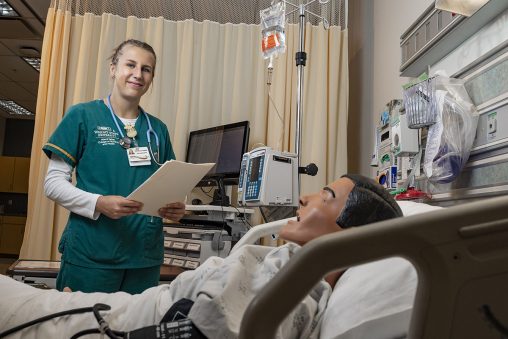
Michelle Rings, a senior nursing major at Wright State, turned a summer internship into her first nursing job at the Cleveland Clinic.
Since coming to Wright State University, nursing major and health communication minor Michelle Rings has had many experiences that have shaped her view of what it will mean to go into the nursing profession. From caring for sick children to experiencing her first patient loss when she and fellow nursing students acted as first responders to an incident on campus, none of it has shaken her resolve.
In fact, Rings, who hails from the Cleveland area, has already secured her first nursing job at the prestigious Cleveland Clinic after she graduates this spring. She was offered the position following a summer externship for students who are entering their final year of nursing school.
During her internship, Rings spent 400 hours working alongside two nurses in a post-operative ward with patients who had gastrointestinal surgery or other abdominal issues.
“I would do assessments, assist with medication, help the nurse chart, basically do anything that the nurse would do but under their supervision,” Rings said. “At the end of the summer they said, if you want a job when you graduate, you have one.”
Rings is excited to begin her career and hopes to one day go into pediatric nursing, either in an infusion clinic where children receive chemotherapy or platelet and blood transfusions or on a pediatric floor working with children or babies.
“I love working in the NICU (Neonatal Intensive Care Unit) at Dayton Children’s Hospital when we have clinicals. I love the idea of helping people, especially children,” Rings said. “When I was growing up, I noticed that when someone I knew got sick, they were treated differently. I want to be in a position someday where I can help give kids as normal a life as possible, even though they are sick or living in the hospital.”
In addition to her studies, Rings has served as president and treasurer of the Omicron Delta Kapa honor society, volunteered with Athletes in Action and was the team captain of the women’s soccer team.
Rings has been playing soccer since she was 3 years old, but she started taking it seriously during her first year of high school when she decided she wanted to play college soccer. During her junior year, Travis Sobers, head coach of the Wright State women’s soccer team, told Rings’ club coach that he thought she might be a good fit for the team.
After visiting Wright State, Rings fell in love with the campus and the soccer program.
Like most student-athletes, Rings said that one of her biggest challenges was time management but noted that both the coaching staff and nursing faculty have been very accommodating.
“It’s just a matter of prioritizing. Whatever you are doing at the moment, commit 100 percent of yourself to it,” she said. “I have three other teammates who are nursing majors, and so we have had to miss practices or we have had to change our clinical schedule, and they work with us to make sure we have what we need to graduate while still being able to be successful for the team.”
In fact, Rings said that Wright State is one of the few universities that will allow students to play Division I soccer and major in nursing because of the time commitments.
Rings said one of the main takeaways from her time at Wright State is the impression of being part of a community that is bigger than herself, both on the soccer field and as a nursing student — something that has helped to prepare her for what lies ahead.
“When I worked at the Cleveland Clinic, they were impressed by how much I knew and how well trained I was, and I realized at that moment that everything that Wright State has given me up until this point has been put to good use,” she said.
When asked what advice she would give to future nursing students, Rings said without hesitation that she highly encourages them to take health communication classes.
“I believe that it has really impacted the care I give. It has made it more personable,” Rings said. “By increasing my understanding of different cultures, races, genders and how all of it can impact their health, it enables me to communicate with them in a more impactful way, sometimes just by the way that I talk with them or even the way that I’m sitting.”

 Wright State celebrates Student Success Champions
Wright State celebrates Student Success Champions  Wright State gold team captures 2024 Horizon League team title, Flynn individual champion
Wright State gold team captures 2024 Horizon League team title, Flynn individual champion  118 medical students to graduate from Wright State’s Boonshoft School of Medicine April 28
118 medical students to graduate from Wright State’s Boonshoft School of Medicine April 28  Wright State University continues to demonstrate its financial strength with another credit rating upgrade from Moody’s
Wright State University continues to demonstrate its financial strength with another credit rating upgrade from Moody’s  Thousands celebrate the end of Spring Semester with food, fun and friendship
Thousands celebrate the end of Spring Semester with food, fun and friendship 